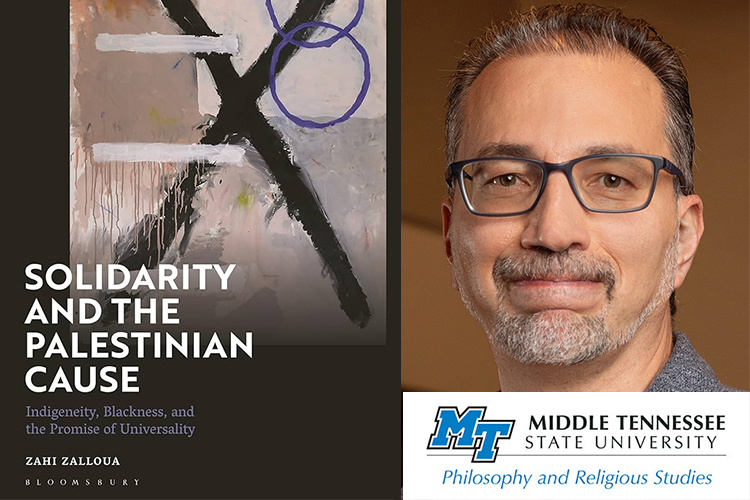MURFREESBORO, Tenn. — A call for justice in Palestine will be the topic of the spring Applied Philosophy Lyceum hosted by Middle Tennessee State University’s Philosophy and Religious Studies Department.

This semester’s Lyceum will be held at 5 p.m. Friday, April 5, in the College of Education Building, Room 164, at 1756 MTSU Blvd. The lecture is free and open to the public and there will be be an informal reception following the Lyceum.
For guest lecturer Zahi Zalloua, “The Palestine question touches us all.”
In his presentation titled “Fanon, Zizek, and the Question of Palestine,” Zalloua will focus on the ways the “figure of the Palestinian appears faceless for most Western powers and mainstream media, posing a challenge for politics, arguing for an anti-colonial reason that adopts the universal demands of politics.”

“Professor Zalloua has centered the question of Palestine in his work for several years,” said Michael Principe, professor of philosophy and organizer of the spring lecture. “His perspective is an important one that should lead to dialogue on campus and beyond.”
Zalloua, Cushing Eells Professor of Philosophy and Literature and Professor of Indigeneity, Race, and Ethnicity Studies at Whitman College, is an author or editor for several books and articles, most recently “Solidarity and the Palestinian Cause: Indigeneity, Blackness, and the Promise of Universality” (Bloomsbury 2023).

“His call for justice in Palestine is not based on particularism, but rather on critical humanism and universalism,” said Principe. “He has also written on literary theory and transhumanism, including an edited collection and several essays on the television series ‘Black Mirror.’”
The current Israeli-Palestinian conflict dates back to the early 20th century when Jews fled persecution in Europe and sought to establish a national homeland. Arabs in the region resisted, leading to a series of wars, with Israel ultimately prevailing. Palestinians primarily live in the Israeli-occupied West Bank, governed by the Palestinian Authority, and Gaza Strip, controlled by the militant group Hamas.
The ongoing Israel-Hamas war stems from the Hamas-led Oct. 7 terror attack that left over 1,000 Israelis dead, mostly civilians. Israel responded with an ongoing offensive in Gaza that has killed more than 30,000 Palestinians, many of which were women and children. It has drawn widespread condemnation across the world for the number of civilians killed and the lack of food and other aid being allowed into Gaza, straining U.S.-Israeli relations.
MTSU’s Lyceum lectures are held in the fall and spring semesters by the Department of Philosophy and Religious Studies in the College of Liberal Arts. The department offers a Bachelor of Science and Bachelor of Arts in Philosophy and Religious Studies.
Students of philosophy develop critical thinking and problem-solving skills through reading, writing and philosophical dialogue inside and outside the classroom. Philosophy examines fundamental ideas regarding life, the universe, religion, morality, politics, history and more.
Off-campus visitors attending the Lyceum should obtain a special one-day permit from MTSU’s Office of Parking and Transportation at http://www.mtsu.edu/parking/visit.php. A searchable campus parking map is available at http://tinyurl.com/MTSUParkingMap.
For more information, email Heather Gibbs at Heather.Gibbs@mtsu.edu, or call 615-898-2907.
— Johari Hamilton (jah2gk@mtmail.mtsu.edu)


COMMENTS ARE OFF THIS POST